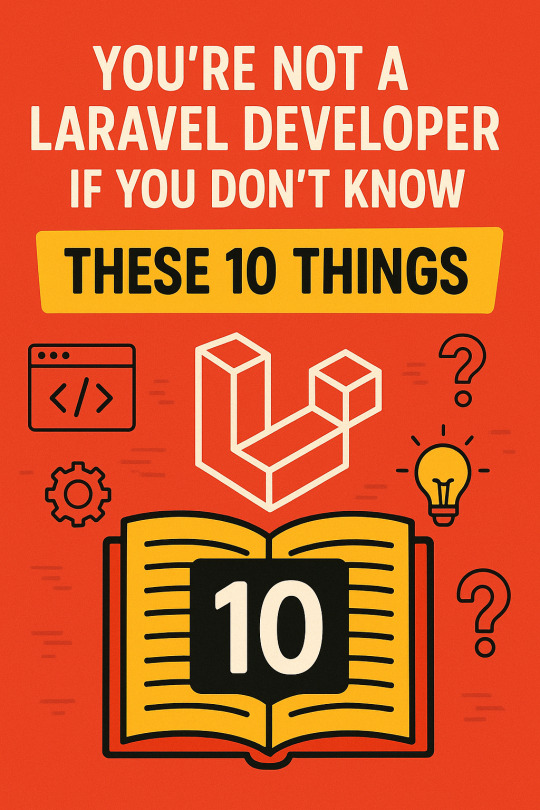#Laravelwebapp
Explore tagged Tumblr posts
Text
You’re Not a Laravel Developer If You Don’t Know These 10 Things

Laravel has redefined how developers build scalable and efficient web applications. Its elegant syntax, rich features, and robust ecosystem make it a top choice for modern PHP development. But what truly separates a Laravel Developer from someone just dabbling in the framework? If you're not familiar with the following 10 concepts, you may need to level up your Laravel game.
Let’s dive into the must-know elements that every professional should master.
1. Laravel Artisan Console
Artisan is Laravel’s command-line interface that automates repetitive tasks. Whether you're generating models, controllers, or database migrations, Artisan commands make development faster and more efficient. If you're not utilizing it daily, you're missing out on one of Laravel’s core superpowers.
2. Routing and Route Model Binding
Laravel’s expressive routing allows you to define web routes cleanly. More importantly, route model binding automatically injects model instances into routes based on the ID, improving code readability and minimizing boilerplate logic.
3. Eloquent ORM Mastery
Eloquent is Laravel’s ActiveRecord implementation for database interaction. A solid grasp of relationships (one-to-many, many-to-many), accessors, mutators, and query scopes is non-negotiable for any skilled Laravel Developer.
4. Middleware for Request Filtering
Middleware filters incoming HTTP requests before they reach your application logic. Whether it’s authentication, CORS headers, or logging, middleware helps maintain clean and modular code.
5. Service Container and Dependency Injection
The Service Container is the backbone of Laravel’s IoC (Inversion of Control). Understanding how to bind classes and interfaces to the container, and injecting them into your classes, is essential for writing testable, maintainable code.
6. Blade Templating Engine
Blade provides a lightweight yet powerful syntax for writing clean HTML templates. Advanced Blade features like components, slots, and conditionals help maintain reusable and readable front-end code.
7. Queues and Jobs
Laravel’s queue system allows you to defer time-consuming tasks like sending emails or processing videos. Knowing how to implement queues and manage failed jobs is crucial for building high-performance applications.
8. Testing with PHPUnit
Laravel provides built-in support for PHPUnit. Feature and unit tests should be part of your development lifecycle. Real Laravel Developers write tests to ensure the stability and scalability of their applications.
9. Event-Driven Architecture
Laravel's event and listener system decouples business logic, improving the flexibility of your application. Events like user registration or order completion can trigger listeners for follow-up actions, like sending emails or notifications.
10. Security Best Practices
Laravel comes equipped with security features like CSRF protection, encryption, and hashing. A true Laravel expert is well-versed in these security protocols to safeguard applications against common threats like SQL injection, XSS, and CSRF attacks.
Final Thoughts
Mastering Laravel isn’t about scratching the surface—it’s about going deep into its ecosystem, tools, and best practices. If you’re serious about becoming a top-tier Laravel Developer, make sure you’ve nailed all 10 of the skills mentioned above. Whether you're working solo or part of a Laravel development company, your value increases when you bring true expertise to the table.
#Laravel Developer#Laravel#LaravelServices#LaravelConsulting#LaravelCompany#Laravelwebapp#LaravelDevelopers
0 notes